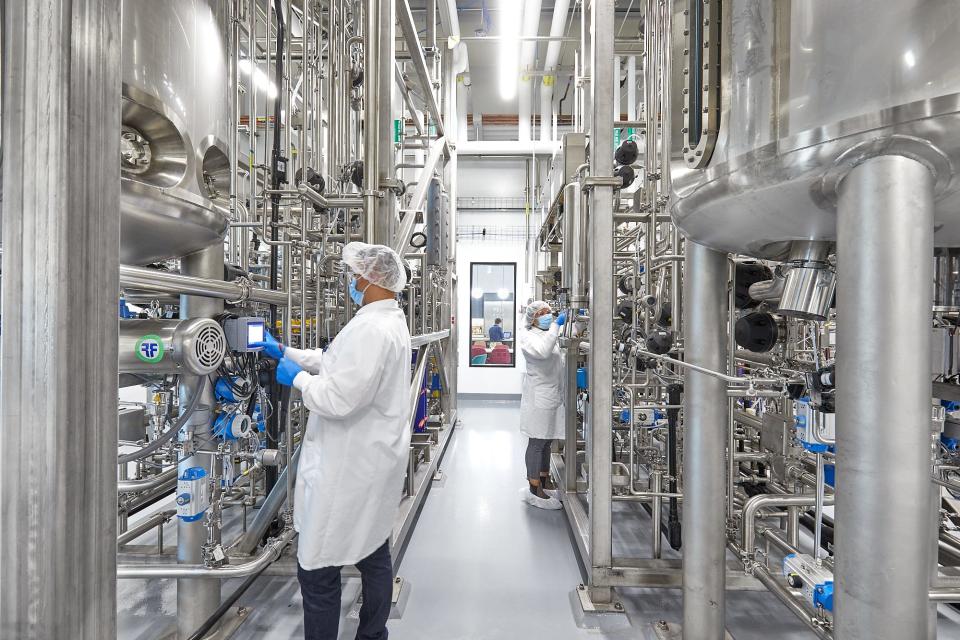FDA says lab-grown meat made by Upside Foods is safe to eat, in a first for the US
The U.S. Food and Drug Administration has determined that a California company's lab-grown meat is safe to eat.
The FDA announced its first-ever pre-market consultation "for a human food made from cultured animal cells" this week – accepting Upside Foods' conclusion that the company's cultivated chicken is safe to eat.
Lab-grown meat – which is also referred to as cell-based, cultured or cultivated meat – is meat made using animal cells. Upside Foods will make its cultivated chicken, for example, by taking living cells from chickens and growing those cells in a controlled environment (outside the animal's body) to make cultured cuts of meat, the FDA notes.
Upside Foods is the first company to receive a "no further questions" letter from the FDA for lab-grown meat, according to a Wednesday press release.
"This is a watershed moment in the history of food," Dr. Uma Valeti (MD), CEO and Founder of Upside Foods, said in a statement. "This milestone marks a major step towards a new era in meat production, and I'm thrilled that U.S. consumers will soon have the chance to eat delicious meat that's grown directly from animal cells."

But don't expect to see cultivated chicken in U.S. grocery stores just yet.
A pre-market consultation is not an approval process, the FDA notes. Upside Foods needs to go to the United States Department of Agriculture Food Safety and Inspection Service next. Still, the Berkeley-based company celebrated the FDA's decision.
"Cultivated meat has never been closer to the U.S. market than it is today!" David Kay, Upside Foods’ director of communications, said in an emailed statement to USA TODAY on Thursday.
Lab-grown 'chicken bites'? Cultured meat product gets world's first regulatory approval
When looking outside the U.S., Singapore is currently the only country where consumers can buy lab-grown meat. In 2020, Eat Just's cultured chicken received the world's first regulatory approval in Singapore.
Lab-grown meat: Potential benefits vs. unknowns
Advocates of lab-grown meat argue that it's an ethical and sustainable alternative to traditional sources of meat – as it uses technology to avoid the raising and slaughtering of animals for food production.
The Humane League, a nonprofit that works to end animal abuse, points to potential environmental and health benefits of cultivated meat, including the possibility of food scientists controlling the amount of "harmful cholesterol and saturated fat in each cut" of lab-grown meat.

But others have criticized cultivated meat – including some products from companies that use fetal bovine serum, a component obtained from fetal blood during the killing of pregnant cows, which arguably contradicts the goals of lab-grown meat.
Experts also point to the numerous questions that haven't been answered yet, with some pointing to production challenges and need for further research. Marion Nestle, professor emerita for nutrition, food studies and public health at New York University, said that, while she is not concerned about the safety of lab-grown meat, there are still too many unknowns.
"It's a technological solution to a complicated problem. We just don't know enough about it," Nestle told USA TODAY on Thursday. "I think there are reasons for hesitancy that make sense, of course. (But) I don't think safety is one of them, and so I wasn't surprised by the FDA decision."
Sustainable eating: Could eating bug powder and fungus meat help fight climate change? Yes, but there are easier ways
Future of lab-grown meat on the US market: What does it taste like? Is it cheap?
Lab-grown meat is still relatively new and obviously not on the U.S. market yet. Nestle's three main questions are: What will the cultivated meat taste like? Can producers scale up to meet demand while ensuring all products are clean/uncontaminated? And how much will it cost?
"At the moment, the technology is very expensive, so nobody's going to be able to afford this," Nestle said, among the other factors. "I think there are too many questions about these kinds of products to be able to say whether this is gonna work or not... (We have to) wait and see."
While Forbes reported in March that the cost of a lab-grown burger, for example, has drastically decreased over the years, experts still maintain that cultivated meat will be significantly more expensive than conventional meat products.

Over recent years, scientists developing lab-grown meat have also worked to mimic the same texture of meat. And Upside Foods' Wednesday news release noted that, because the cultivated meat is made in a controlled environment, there's potential to help reduce the risk of bacterial contamination.
Still, lab-grown meat needs to make it onto more shelves worldwide before experts can determine the results and impact.
Watch: Researchers grow meat in a lab that feels like the real thing
What's everyone talking about? Sign up for our trending newsletter to get the latest news of the day
Upside Foods is not the only company seeking to bring lab-grown meat to the future U.S. market.
On Wednesday, the FDA confirmed the agency has also "already engaged in discussions with multiple firms about various types of food made from cultured animal cells, including food made from seafood cells that will be overseen solely by the FDA."
This article originally appeared on USA TODAY: Lab-grown chicken is safe to eat, US FDA announces for first time

